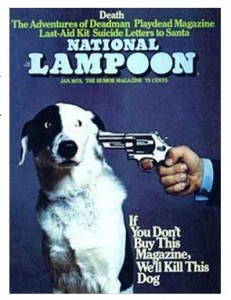 The status of newspapers as essential utilities gets a boost in a narrow-minded NPR report entitled “Imagining A City Without Its Daily Newspaper.” Reporter David Folkenflik takes us to Hartford, Conn., a typical small American city whose daily newspaper is doing as badly as every other typical small city daily newspaper. What would happen, Folkenflik speculates, if the Hartford Courant ceased to be?
The status of newspapers as essential utilities gets a boost in a narrow-minded NPR report entitled “Imagining A City Without Its Daily Newspaper.” Reporter David Folkenflik takes us to Hartford, Conn., a typical small American city whose daily newspaper is doing as badly as every other typical small city daily newspaper. What would happen, Folkenflik speculates, if the Hartford Courant ceased to be?
In a word: disaster. “[F]ormer Gov. John Rowland wouldn’t have faced corruption charges a few years back,” Folkenflik suggests. Nor is it likely that Hartford’s mayor would have been indicted on bribery charges recently. “The Courant was out ahead on that, too. The paper has exposed polluters and the deployment of mentally ill soldiers to Iraq.” And that’s not even considering its kinder, gentler side. What would local theatre companies do without the vital reviews in the newspaper?
Our guess is that they’d think of something. What makes the NPR report such rubbish is that it fails to consider the possibility that other sources of information could emerge to fill the coverage gaps the story describes. The piece even quotes Trinity College President James F. Jones Jr. furthering the myth that only newspapers can cover local news. “The New York Times is not going to write about the local basketball teams or the local color stories,” the perfesser says. True, but have you considered that maybe somebody else will?
 The all-or-nothing scenario outlined in this report is fundamentally flawed. It’s surprising that the usually thorough NPR editors would let such a myopic analysis go through. Maybe the layoffs there are having an impact.
The all-or-nothing scenario outlined in this report is fundamentally flawed. It’s surprising that the usually thorough NPR editors would let such a myopic analysis go through. Maybe the layoffs there are having an impact.
For a contrasting view, consider a post by Dana Blankenhorn that challenges the evolving wisdom in some parts of the industry that newspaper publishers need public support in order to continue providing their vital public service.
Invoking National Lampoon‘s famous “If You Don’t Buy This Magazine, We’ll Kill This Dog” cover, the blogger dares publishers to follow through on threats to maroon readers without their government watchdogs. “Please do it. Please, please, please… I would gladly go into business against you, giving people access to local government…There are literally thousands of entrepreneurs…anxious to do the same,” he writes. Conventional wisdom is that you have to pay people a salary to cover city council meetings, but maybe there are those who would do it because, you know, they like hanging around city council meetings.
Comments
This entry was posted on Friday, February 6th, 2009 at 5:47 pm and is filed under Hyper-local. You can follow any responses to this entry through the RSS 2.0 feed. Both comments and pings are currently closed.



[…] Paul Gillin, proprietor of the Newspaper Death Watch blog, comes Blankenhorn’s Kvetch of the Week-winning blitzkrieg: “Journalism is not the […]
So your lambasting David Folkenflik for speculation and as narrow-minded (welcome to blogs, home of the ad-hominem attack) when in your own blog you have this sentence?: “Our guess is that they’d think of something.” Well there’s a well-founded thought if I’ve ever seen one.
Or how bout this?
“have you considered that maybe somebody else will?” Maybe? Can you give us one example?
I have been to dozens of city council, county commission and other governmental meetings. At most of those meetings there was at least one other newspaper reporter. Sometimes there was a radio reporter. The only times there were TV reporters were when something big was on the agenda, and sometimes not even then. Not even once was there a blogger (sometimes there were zero citizens other than officials and me). Do you mean to tell me that you foresee a day when non-newspapers cover Lawton, Oklahoma city council or Graham County, NC county commission, much less LA or NYC councils? How in the world can you say the Net will fill the gap that television, newspaper’s previous bugaboo, couldn’t?
As a former Wall Street Journal reporter, now blogger watching with chagrin from the sidelines I agree with your points in yur blog
You know I used to go as a photographer to cover those council meetings. Yes there were people there who seem to enjoy hanging out at the meetings, but i doubt that made them qualified to cover it journalisticly.
Democracies thrive on an educated and informed citizenry. Its a big gamble that we take it for granted that something will come along and take the place of newspapers.